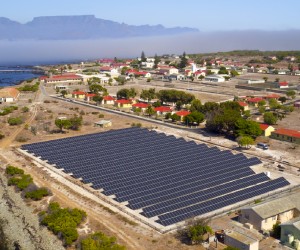South Africa’s advanced industrial and financial sectors, together with its abundant natural resources, have contributed in making it the second largest economy in Africa. But to bring power to the remotest corners of the country, to maintain its economic growth momentum and to reduce its carbon footprint, it must accelerate the adoption of efficient, economic, sustainable and eco-friendly modes of power generation
As the population increases, urbanisation intensifies, and climate change concerns heighten, the clamour for clean and decentralised electric power generation will increase. In that effort, distributed energy resources and off-grid power generation will play a key role.
Powering the African labour market
On-site, off-grid electricity generation can put the dream of affordable, safe, clean and reliable power within reach for every African. On one hand, it presents a massive commercial opportunity for African utilities to reach millions of people who live in dense, yet untapped, communities without a prohibitive financial outlay. On the other hand, the production of off-grid components, such as solar-based products, can create employment for hundreds of thousands on the continent. Job creation and income generation can further support sustained progress in electricity access and uptake, enhancing firms’ and households’ ability to pay. This will generate financial benefits for utilities and make electricity expansion economically viable, further encouraging investment and higher utilisation.
New possibilities
Rooftop solar photovoltaic (PV) systems, small wind farms, microgrids and battery energy storage will also allow consumers to generate their own power as well as sell it back to the utility, giving rise to new and competitive business models which will further optimise the cost of electricity. It will also lead to the development of more renewable energy technologies and associated industries such as electric vehicles, greatly reducing emissions of harmful carbon-based and other toxins.
The good news is that integrating solar PV and wind plants into the existing electric networks is already cheaper than it was ten years ago, with costs predicted to drop even further in the foreseeable future. Battery costs are already plummeting. These developments provide opportunities to produce and store more renewable energy and expand its usage. Such distributed energy resources can be integrated with a wide range of diverse conventional electricity resources, enabling an uninterrupted, efficient and clean supply of power.
According to a statement made in August 2018 by Jeff Radebe, Minister of Energy at the time, the government aims to produce 27,6 gigawatts (GW) of electricity using renewable resources (solar, wind, and hydro) by 2030 resulting in the creation of hundreds of thousands of new jobs. Technological progress underpinning off-grid electricity systems can provide enough electrical capacity for productive higher-tier uses at a significantly lower cost[1].
Transition to clean energy generation
The ABB microgrid solutions with battery energy storage systems are already ensuring stable and sustainable power, harnessing solar energy, and serving as a global model for the clean-energy future at the World Heritage Site Robben Island
For microgrid solutions with battery energy storage systems, ABB’s energy management system, the ABB Ability™ e-mesh™, monitors and controls system performance and helps to improve energy efficiency, fault identification and predictive maintenance through accurate demand planning and generation forecasting.
The solution covers the whole distributed energy ecosystem end-to-end, ensuring a safe and reliable supply of power. Although South Africa envisions a green economy wherein everyone has access to safe electricity, it needs to take a much bigger step towards more rapid integration of renewables into the power grid. As more and more people join the labour-force and climate change concerns worsen, the country must be more proactive in the rollout of smart power technologies which will help it provide a better standard of living to all its people.











